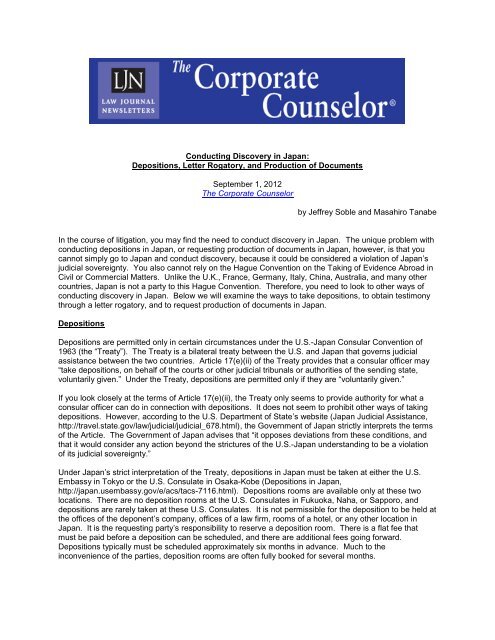Checking Out the Historical Background of Letters Rogatory in Legal Frameworks
Checking Out the Historical Background of Letters Rogatory in Legal Frameworks
Blog Article
Letters Rogatory Explained: Facilitating Legal Teamwork Between Countries

Interpretation of Letters Rogatory
Letters rogatory are formal demands made by a court in one territory to a court in another territory, looking for help in acquiring evidence or statement for a legal action. This step-by-step device is vital in the context of international law, where legal systems might vary, and cross-border collaboration is essential. Letters rogatory help with the event of details that may be important for adjudicating instances, especially in instances including intricate transnational problems.
Normally, these demands occur in civil, criminal, or administrative issues where an event calls for proof that is located outside the jurisdiction of the requesting court. The letters act as a way to make sure that the concepts of due procedure are upheld, enabling courts to access evidence that may otherwise stay unattainable as a result of lawful or geographical obstacles.
The usage of letters rogatory is controlled by global treaties, reciprocal arrangements, or residential regulations, which mark the treatments and commitments of the courts entailed. It is necessary to keep in mind that the implementation of such requests is not ensured; they depend upon the laws and practices of the jurisdiction receiving the letter. Hence, letters rogatory are a crucial device for cultivating lawful participation and making certain justice throughout borders.
The Process of Issuing Letters Rogatory
Issuing letters rogatory entails a structured process that ensures conformity with both international and residential lawful requirements. Initially, the asking for event, commonly a court or lawful authority, drafts an official demand detailing the nature of the assistance looked for, the evidence or information required, and the legal basis for the demand. This file must be specific to help with understanding by the foreign territory.

The following step includes transferring the letters rogatory to the assigned foreign authority. This is typically done with diplomatic channels or global lawful help structures, making sure that the request is obtained and recognized by the foreign court. The foreign court after that refines the request according to its own lawful treatments, eventually reacting to the requesting event with the desired info or evidence, thus facilitating international lawful participation.
Relevance in International Legislation
The importance of letters rogatory in international regulation can not be overemphasized, as they act as an important mechanism for judicial cooperation throughout borders. These official ask for support in lawful matters allow courts in one territory to seek details, evidence, or the presence of witnesses from an moved here additional jurisdiction, therefore assisting in the administration of justice in global cases.
Letters rogatory are specifically crucial in the context of globalization, where legal conflicts frequently extend several nations. They allow the collection of proof that may or else be unattainable, making certain that legal process are notified and reasonable. By fostering cooperation between judicial systems, letters rogatory assistance copyright the policy of law and promote common respect among countries.
Furthermore, using letters rogatory demonstrates a commitment to global norms and principles of participation, reflecting the interconnected nature of contemporary lawful practices. It shows the relevance of adhering to recognized procedures and treaties, such as the Hague Convention, which provides a structure for these requests - Letters rogatory. Inevitably, letters rogatory improve the efficiency of legal processes, making sure that justice is not hindered by geographical boundaries
Difficulties and Limitations
Regardless of their relevance, letters rogatory face several difficulties and restrictions that can restrain their effectiveness. One primary issue is the varying legal structures and treatments throughout territories, which can bring about misunderstandings and delays in the execution of requests. Different countries may have distinct demands for the credibility of letters rogatory, complicating the process additionally.
Additionally, the often drawn-out nature of worldwide legal teamwork can impede prompt accessibility to proof or witnesses. This investigate this site delay may negatively affect continuous examinations or lawful procedures, especially in cases requiring urgent activity. The absence of sources and training in some jurisdictions can result in inadequate handling of requests, leading to insufficient or incomplete responses.
Nations with less formal lawful systems may have my review here a hard time to abide with the procedural roughness anticipated in letters rogatory. These challenges require continual dialogue and reform to improve the efficiency of letters rogatory in lawful cooperation.
Situation Studies and Examples

On the other hand, obstacles can occur, as seen in an instance involving a European nation looking for evidence in a continuous criminal issue from a non-EU nation - Letters rogatory. The process was postponed due to administrative difficulties and differing legal criteria, ultimately impeding the examination
These instances illustrate that while letters rogatory can assist in global cooperation and accelerate lawful proceedings, they also highlight the requirement for clear interaction and understanding of lawful frameworks between countries. Such case studies highlight the relevance of refining this device to enhance effectiveness and efficiency in international lawful issues.
Conclusion
In summary, letters rogatory function as a crucial device for promoting lawful cooperation in between countries, making sure the collection of proof and testimony across jurisdictions. Their importance in worldwide legislation can not be overemphasized, as they advertise due procedure and improve the effectiveness of cross-border lawful procedures. Nevertheless, difficulties such as varying lawful frameworks and political tensions might prevent their performance. Continued efforts to simplify and boost the procedure are important for fostering stronger global judicial cooperation.
Letters rogatory are formal demands made by a court in one jurisdiction to a court in another territory, seeking aid in acquiring evidence or statement for a legal case. The requesting event, normally a court or legal authority, composes a formal demand outlining the nature of the assistance looked for, the evidence or info needed, and the lawful basis for the request. The foreign court after that processes the demand according to its own lawful treatments, ultimately responding to the requesting party with the desired info or proof, therefore facilitating worldwide lawful collaboration.
In addition, the use of letters rogatory shows a commitment to worldwide standards and principles of teamwork, reflecting the interconnected nature of contemporary lawful practices.Worldwide lawful cooperation via letters rogatory is not without its real-world ramifications, as highlighted by various situation researches that highlight both successes and challenges.
Report this page